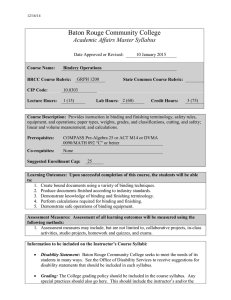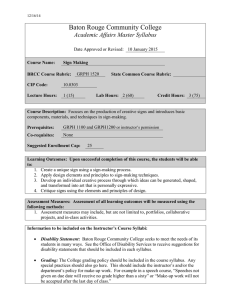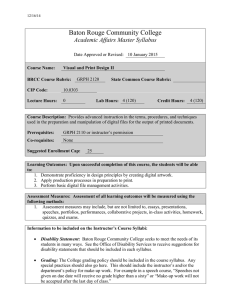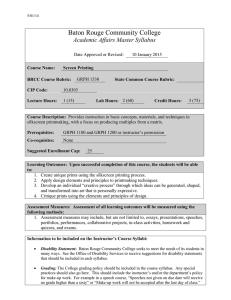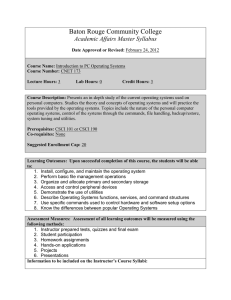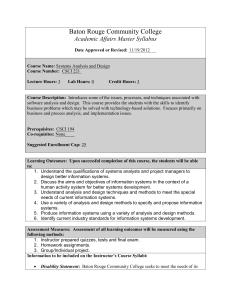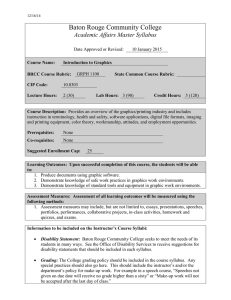Baton Rouge Community College Academic Affairs Master Syllabus
advertisement
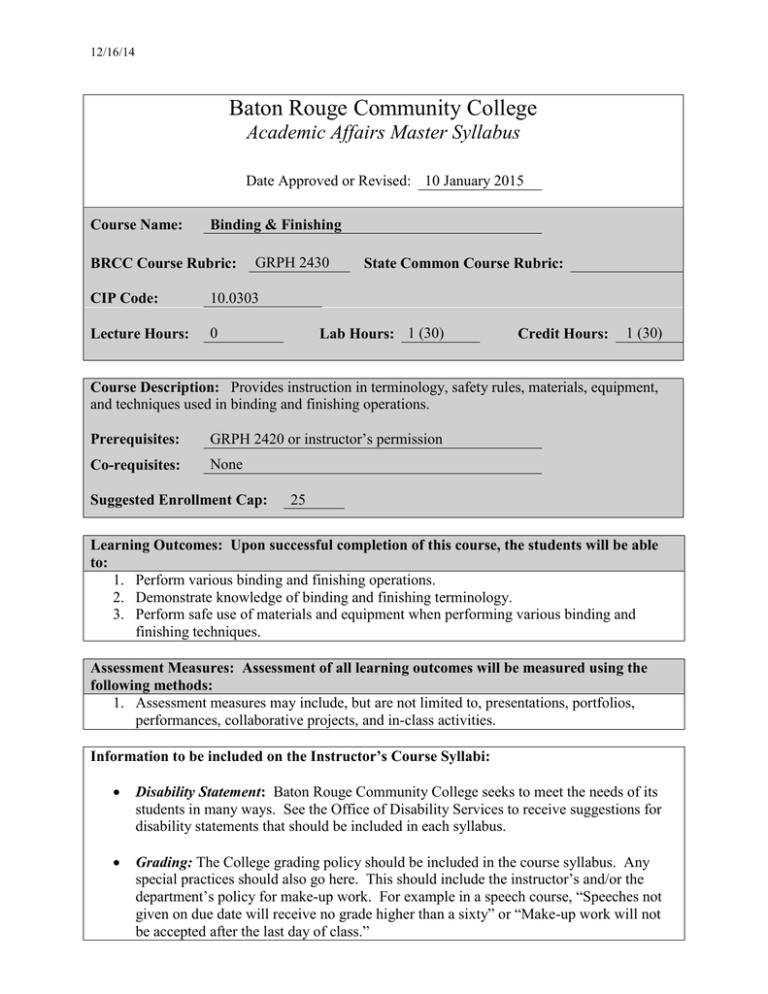
12/16/14 Baton Rouge Community College Academic Affairs Master Syllabus Date Approved or Revised: 10 January 2015 Course Name: Binding & Finishing BRCC Course Rubric: GRPH 2430 CIP Code: 10.0303 Lecture Hours: 0 State Common Course Rubric: Lab Hours: 1 (30) Credit Hours: 1 (30) Course Description: Provides instruction in terminology, safety rules, materials, equipment, and techniques used in binding and finishing operations. Prerequisites: GRPH 2420 or instructor’s permission Co-requisites: None Suggested Enrollment Cap: 25 Learning Outcomes: Upon successful completion of this course, the students will be able to: 1. Perform various binding and finishing operations. 2. Demonstrate knowledge of binding and finishing terminology. 3. Perform safe use of materials and equipment when performing various binding and finishing techniques. Assessment Measures: Assessment of all learning outcomes will be measured using the following methods: 1. Assessment measures may include, but are not limited to, presentations, portfolios, performances, collaborative projects, and in-class activities. Information to be included on the Instructor’s Course Syllabi: Disability Statement: Baton Rouge Community College seeks to meet the needs of its students in many ways. See the Office of Disability Services to receive suggestions for disability statements that should be included in each syllabus. Grading: The College grading policy should be included in the course syllabus. Any special practices should also go here. This should include the instructor’s and/or the department’s policy for make-up work. For example in a speech course, “Speeches not given on due date will receive no grade higher than a sixty” or “Make-up work will not be accepted after the last day of class.” Attendance Policy: Include the overall attendance policy of the college. Instructors may want to add additional information in individual syllabi to meet the needs of their courses. General Policies: Instructors’ policy on the use of things such as beepers and cell phones and/or hand held programmable calculators should be covered in this section. Cheating and Plagiarism: This must be included in all syllabi and should include the penalties for incidents in a given class. Students should have a clear idea of what constitutes cheating in a given course. Safety Concerns: In some programs this may be a major issue. For example, “No student will be allowed in the safety lab without safety glasses.” General statements such as, “Items that may be harmful to one’s self or others should not be brought to class.” Library/ Learning Resources: Since the development of the total person is part of our mission, assignments in the library and/or the Learning Resources Center should be included to assist students in enhancing skills and in using resources. Students should be encouraged to use the library for reading enjoyment as part of lifelong learning. Expanded Course Outline: 1. Safety considerations working with bindery equipment 2. Safe paper carrying methods and basic jogging and counting techniques 3. Paper collating, padding, and drilling procedures 4. Folding equipment to produce various folded jobs 5. Use, set up, cut options, and blade replacement on automatic paper cutters 6. In-line and off-line finishing systems 7. Side and saddle stitched/stapled products 8. Packaging and shipping equipment, materials, and methods 9. Foil stamping and embossing equipment and list the operational procedures 10. Modern case binding for books 11. Paper handling, storage, and inventory techniques 12. Coating and laminating techniques 13. Estimating costs and wastes for various bindery operations 14. Bindery procedures, quality control methods, and preventative maintenance 15. Specialty folding techniques 16. Database personalization and other mailing techniques 2
